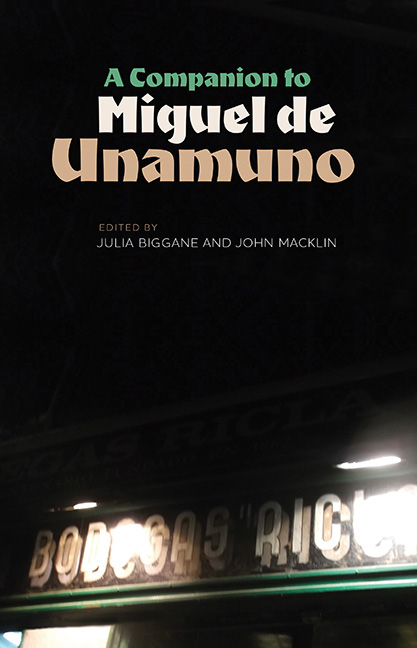7 - A Question of Ethics: Exploring Issues of Right And Wrong in Unamuno
Published online by Cambridge University Press: 21 May 2021
Summary
There is no doubt of the fundamentally ethical preoccupations of Unamuno. What is less clear is the degree to which he was ever concerned with the difference between right and wrong in any conventional sense, still less with the importance of acting upon it. His writings, whether fictional or non-fictional (and all variations in between), effectively challenge us – with unrelenting consistency – to think about right and wrong. Ethical or moral decisions are not necessarily central in his texts, but may emerge in ways that are consequential to other concerns of plot or argument. At times, as with the subplots of Niebla (Olson 1984: 68–75) they will be dealt with, or brought in as deliberately inconsequential matter, rather than being focused upon as the major issue. As far as the reader is concerned, it is deliberately not made clear what we are to do, or indeed to think, in the face of Unamuno's provocative drawing of new lines. His work is designed to push the reader into his or her own decisions about what is or is not ethical, or ‘good’, or ‘wrong’. There is no such easy thing as ‘telling’ in the sense of informing and guiding. Instead there is the presentation of painful and complex situations to which we are invited to react. His concern, at least if we are to believe him, is not that we should think a particular thing, but rather that we should think.
Unamuno's concern with the individual as free-standing, responsible for taking his or her own decisions in life, follows in a broad European existentialist tradition. Most specifically we might contextualize his framing of the burden of individual choice within the work of two writers: Nietzsche and Kierkegaard. In the case of Nietzsche, an inevitable cornerstone of the intellectual formación of Unamuno and his contemporaries in Europe (not just in Spain), we find emphasis on those beliefs formerly held as absolute as being no more than human constructs. This forms part of the intellectual basis for Unamuno's philosophical approach with its focus upon the requirement that we all think for ourselves (see Guignon 1998).
- Type
- Chapter
- Information
- A Companion to Miguel de Unamuno , pp. 137 - 152Publisher: Boydell & BrewerPrint publication year: 2016
- 1
- Cited by



